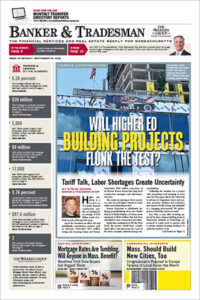A new analysis by Boston think-tank The Pioneer Institute is urging Massachusetts legislators to tackle the often-slow – and therefore expensive – process of permitting new housing alongside other tools for boosting home construction.
Despite the 2020 Housing Choice reform championed by then-governor Charlie Baker, which made it easier for municipalities to pass zoning changes that unlocked new housing production, authors Andrew Mikula and Salim Furth argue, state law still makes it too hard to approve special permits for new housing.
Special permits are a common zoning tool that give local planning boards the ability to zone for new multifamily housing in a certain area, but still retain the ability to vote on individual projects. State law still requires boards to approve special permits by a two-thirds majority, instead of a simple majority.
Mikula, the senior housing fellow at The Pioneer Institute, and Furth, a senior research fellow at the Mercatus Center at George Mason University in Northern Virginia, argue that the special permit voting requirement should be dropped along with six other major reforms to how housing developments get permitted drawn from interviews with nearly two dozen planners, lawyers, developers, government officials and scholars.
“The hearing process is a burden on all involved; one public-sector interviewee ‘attended 150 hearings in one 18-month period,'” the report states.
The report also notes a sizable hole in state land-use law: the lack of a definition for “site plan reviews” carried out by town and city planning boards. This has led to “many” lawsuits and delays, the report states, with “[m]ultiple interviewees recalled site plan reviews delayed over aesthetic ‘nitpicking’ that should not have been part of site plan review.”
Municipalities are still allowed to conduct site plan reviews of new housing proposed under the MBTA Communities law, even if the project can be built as-of-right, without violating the site’s zoning.
Instead, Mikula and Furth argue, the Legislature should define site plan review as a technical process only, covering issues like traffic circulation, stormwater runoff and building placement, and only conducted by professional municipal staff, without a board vote.
Other reforms called for in the report:
- Shrinking the delay from 14 days between continued public hearings, down to five days.
- Allow third-party administrative reviews of building permit applications in towns that don’t have enough staff.
- Vesting development rights at the first request for building permits and zoning approvals for all types of projects, not just subdivisions.
- Harmonize state and local environmental standards.
- Establish specific and objective standards for design reviews conducted by local boards.
- Require abutters appealing land use decisions to submit a written opinion from a certified professional who can back up their claims.
“Solving the commonwealth’s housing problems will require making the permitting process more easily navigable,” Mikula said in a statement.
A blue-ribbon commission convened by Gov. Maura Healey issued its own report Friday that included a number of other ideas for reforming how housing is permitted, with an eye towards speeding up housing production.







